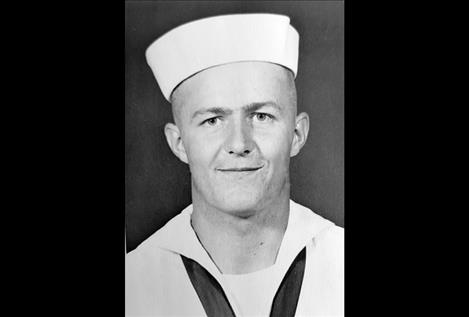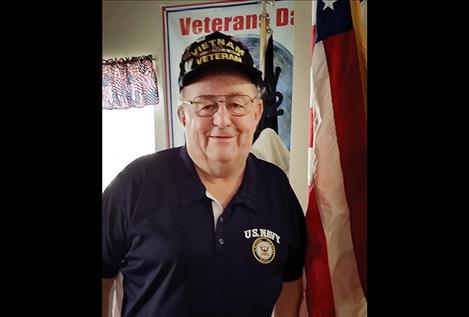Veteran Spotlight
Jack C. Fay January 19, 1942 Vietnam U.S. Navy Machinist Mate 2nd Class (MM2)
Hey savvy news reader! Thanks for choosing local.
You are now reading
1 of 3 free articles.
Jack Fay’s buddies who had gotten their draft notices told him he was on his way to being next. He didn’t want to dig foxholes for the Army and he liked water and ships, so he talked to a Navy recruiter in Missoula. On Sept. 5, 1961 he officially joined the Navy.
Boot camp was 12 weeks in San Diego. Jack liked it ok, but it was damp and dreary. He went in as a Recruit with one little stripe and finished as a two-stripe Seaman. At the end of boot camp he had a 14-day leave and then reported for Class A Machinist Mate School at Great Lakes Training Station near Chicago, Illinois.
Jack was only there one week when came down with pneumonia and was taken by ambulance to the hospital. It was Christmas and he remembers USO girls and people from the town visited the hospital and took great care of the guys. If he had stayed in the hospital for 30 days or more, his orders would have been changed but he wanted to complete this particular school so he requested to be dismissed after 29 days and joined the next 16-week class. On board mock ships he learned about steam and steam power. Jack says all he knew at that point was that steam came out of a teakettle. The school covered all the mechanics of the ship – air conditioning, refrigeration and life boat operation as well as engines and boilers. The bridge would order so many RPMs (revolutions per minute) and the engine room had to bring the boilers up to that power.
During training the Navy learned Jack could type so instead of standing some of the four-hour watches, he was assigned to make out liberty cards. At the end of the school Jack went through tests and reviews to see if he was compatible with MMA duty. He was, so he got his third stripe and became a Fireman. If not, instead of being in the engine room, he would have been assigned topside as a “deck ape.”
After he went home for another 14-day leave, he was assigned to the USS Pollux AKS4, a supply ship in the Asian Pacific. No one at home or in his family thought much about the assignment – at that time no one knew what the war in Vietnam was going to turn out to be.
Jack reported to San Francisco, California for duty. What did he think of San Francisco? “I never saw it,” Jack says. He was immediately flown by Navy plane by way of Japan and Guam to the Philippines where he caught up with his ship. These were not luxury flights – seats were benches along the sides and beverage service was finding a drink after he got off the plane.
The Pollux picked up supplies in Yokosuka, Japan, and delivered them to ships at sea between there and Subic Bay, Philippines. Then they picked up new supplies and made more deliveries on the return to Japan. Each run took 4-6 weeks. Supplies were transferred from the Pollux to the receiving carrier or destroyer ship in nets attached to a pulley line. Jack jokes that they were the “toilet paper run,” but they were actually like a “floating grocery store” carrying food, and other supplies. Another inside joke was that if they didn’t like your ship, they’d dump your toilet paper in the ocean. Jack says they had good cooks, and as a supply ship, good food. He never lost weight on the Pollux.
Jack had “liberty” at each end of the run. Some of the crewmen had their families quartered in Yokosuko. These guys were called “brown baggers.” In Subic Bay, the Navy base was next to Clark AFB. A mile-long strip along the shore was lined with two-story bars, each with a live band, usually playing rock and roll music. There was always competition between Navy guys and AFB guys for girls. Jack had to be picked up to return to the ship by midnight, girls or no girls. He usually rode in a jitney, an old WWII jeep, for 10 centavos, or about 10 cents U.S.
About every two years guys were shifted to new ships. After 18 months, Jack was switched to the Firedrake AE14 which was an ammunition supply ship. They traveled the same supply route except now they were carrying bombs and ammunition. This was much more serious duty. One time the Firedrake was in the Tonkin Gulf just off the Vietnamese coast, loaded, when general quarters was called. The North Vietnamese had fired a torpedo at them. It was very scary to see the torpedo trail across the bow. Five destroyers quickly escorted them out of the gulf and they never went back in that close again.
One night on “liberty” a buddy got/stole a monkey. He tried to figure how to get it back onboard and finally put it in the loose front of his jumper. Someone had called Shore Patrol and Jack’s group got chased all the way back to the ship. The monkey escaped, jumped off the ship and swam back to shore. Every man involved had to take a 13-day series of rabies shots in the stomach and were quarantined for 30 days. So much for that prank!
On the Pollux, the watch schedule was four hours on, four hours off. On the Firedrake it was eight hours on, eight hours off. Both ships were huge – Jack says you could put the whole town of Ronan including all the buildings on deck. Each ship had about 280 crewmen.
When the Firedrake left Japan to return home to the States, there were two checkerboards and 31 fifths of whiskey on board. After 26 days of playing checkers and finishing off the whiskey, they docked at the Naval Ammunition Depot at Port Chicago, north of San Francisco.
Jack got out of the Navy Sept. 5, 1965, exactly four years after he went in. He had no leaves after he went overseas so he had a lot of leave time accumulated. He considered staying in but the officer he interviewed with didn’t make it sound all that attractive, and Vietnam was heating up. He said, “I guess I’ll just go home.” Luckily, he missed the official extension of service for the Vietnam war by one day.
He’d advise young people today to consider the Navy – it’s a good way to get free schooling. At one point he thought of going back in himself and staying ‘til retirement. But then plans changed – he met his wife to be, Marge, and that was that.
Thank you for your service, Jack.

















